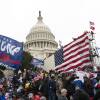It’s official: Two years ago this February, COVID-19 came to Massachusetts. It feels like a lifetime ago — and at the same time, like yesterday. Then, there was only one case confirmed in the state: a UMass student who had traveled to Wuhan, China. Scientists had pinpointed Wuhan as the site where the global spread began, but they still didn’t have many answers about how the mysterious virus worked. The virus was spreading even as our former president said it was nothing to worry about, and while fear, and the byproduct of that fear — blame — were on the rise across the nation.
More Commentary
It didn’t take long before Asian Americans were the targets of xenophobic attacks and public rants to “take that virus back to China.” Asian American children were shunned and taunted at school. Customers stayed away from Asian-owned and -operated businesses, which quickly lost significant revenue. In Boston's Chinatown, home to a large Asian community, businesses estimated a 50 to 70% drop in customers during what was also the start of the Lunar New Year, an annual celebration that typically attracts extra tourists for the dining and feasting.
Proprietors felt helpless to combat the racist rhetoric and misinformation. Michelle Wu — then a Boston city councilor — pushed back, saying, “We know there's no more likelihood of someone coming into contact with coronavirus in Chinatown than any other community in the state." Wu worked with Nina Liang of the Quincy City Council to help organize a dim sum brunch in Boston’s Chinatown in February 2020. Liang, the first Chinese American president of the Quincy Council, told reporters, "Being racist is not the way." The 400 guests who crowded into the venerable China Pearl restaurant for the event were early supporters of a burgeoning vocal movement against Asian hate.
In the two years since that first COVD-19 February, I’ve watched the response to the virus became racialized — with both targeted as well as indiscriminate assaults on Asian Americans. In March of last year, the shootings at two Atlanta spas killed several people of Asian descent. A month later, a brutal attack on Yao Pan Ma in New York City’s East Harlem neighborhood got national attention. The 62-year-old suffered extensive injuries after being bashed in the head from behind. He remained hospitalized until he died last year on Dec. 31. Police marked his death a homicide.
Given both the country’s ongoing struggle with racial tension, and the charged context of everything having to do with the coronavirus pandemic, I was not surprised when Wu — now the first Asian American mayor of Boston — ticked off bigoted comments aimed at her, like the one stating that “Communist Wu needs to go back to China” or one complaining about “another oriental in a government position.”
Ma was attacked in April 2021, the same month that Congress, by a vote of 94-1, approved legislation to protect Asian American and Pacific Islanders against hate crimes. Ma’s attacker goes to court this week. Nearly 900,000 Americans have died from COVID-19, but the most virulent mutation is still racism.








